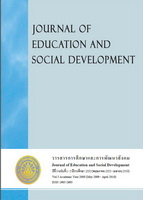ชุมชนกับการจัดการอุทกภัยปี พ.ศ. 2554 : กรณีศึกษาชุมชนอยู่เจริญ เขตดอนเมือง กรุงเทพมหานคร (อยู่เจริญโมเดล)
Main Article Content
Abstract
บทคัดย่อ
การวิจัยเรื่องชุมชนกับการจัดการอุทกภัยปี พ.ศ. 2554 กรณีศึกษา ชุมชนอยู่เจริญ เขตดอนเมืองกรุงเทพมหานคร (อยู่เจริญโมเดล) เป็นการวิจัยเชิงคุณภาพที่ใช้การสัมภาษณ์จากภาคีที่เกี่ยวข้อง 3 ภาคส่วน คือ ประธานชุมชนหรือผู้นำชุมชน ตัวแทนกรรมการชุมชน และตัวเทนของประชาชนที่มีบ้านพักอาศัยในชุมชน ผลการศึกษาพบว่า ชุมชนอยู่เจริญ เป็นชุมชนเขตเมือง ที่เป็นชุมชนของผู้มีรายได้ระดับปานกลาง เป็นชุมชนที่ผู้อาศัยอพยพมากจากต่างจังหวัดทุกภูมิภาคเพื่อมาประกอบอาชีพในกรุงเทพมหานคร จึงทำให้เป็นชุมชนที่มีความคล่องตัวสูงในการรวมกลุ่มเพื่อพัฒนาชุมชน เพราะวิถีชีวิตเดิมมีการเอื้ออาทร มีจิตอาสาสูง จึงเป็นทุนที่สำคัญของชุมชน ดังนั้นการกอบกู้วิกฤตอุทกภัยจึงมีปัจจัยดังกล่าวนี้เป็นทุนที่สำคัญอย่างหนึ่ง นอกจากนี้ มีปัจจัยที่นำมาซึ่งความสำเร็จในการกอบกู้วิกฤตน้ำท่วม โดยมีปัจจัยหลักจากการมีผู้นำชุมชนที่เข็มแข็งเป็นนักบริหารจัดการ ศักยภาพของทรัพยากรมนุษย์หรือคนในชุมชนที่มีการศึกษาดี มีอาชีพหลากหลายที่นำมาช่วยพัฒนาชุมชนในภาวะวิกฤต การมีส่วนร่วมของทุกภาคส่วนในชุมชน การมีความสามัคคีมีน้ำหนึ่งใจเดียวกันของประชาชนในชุมชน การมีเครือข่ายทางสังคมที่ดีทั้งภายในและภายนอกชุมชน ประชาชนในชุมชนมีรายได้ระดับปานกลางทำให้เกิดพลังกลุ่มได้ง่าย คณะกรรมการของชุมชนมีการทำกิจกรรมที่ทำให้เกิดรายได้ เพื่อเป็นทุนในการนำไปพัฒนาชุมชน นอกจากนี้การมีทำเลที่ตั้งที่เหมาะสมก็เป็นปัจจัยเสริมที่ทำให้การกอบกู้วิกฤตที่สามารถจัดการได้ดีด้วย
ABSTRACT
The objective of this research was to investigate the achieving factors for flooding management of Yu-Chareon Community, Don Muang District, Bangkok. The researcher had interviewed three groups of stakeholders, these were : the community leader; the representatives of the community committee; and the representatives of community residents.
The results were as follow : Yu-Chareon Community was an urban community of average income families. The majority of the residents were moved from all regions of Thailand to work in Bangkok. It was, as a result, easy to from a collaborated group for community development. As most of these residents’ traditional ways of living encouraged the spirit of helping each other and of volunteerism. This became the community’s principle assets in rescuing the Great Flooding Crisis. Other principle factors included: the community leadership-the leader himself was a capable manager. Besides, the community residents were well-educated and carried on various career fields which were useful for solving crisis. Moreover, the participation from all stakeholders in the community and the community unity, including the strong and capable social networks both inside and outside the community were also beneficial. The fact that the community consisted of the average income residents, it helped strengthen the group power. Furthermore, the community committee had arranged activities to yield income for the community development programs. Finally, the community was situated on the suitable location that helped generate better management during the crisis.

